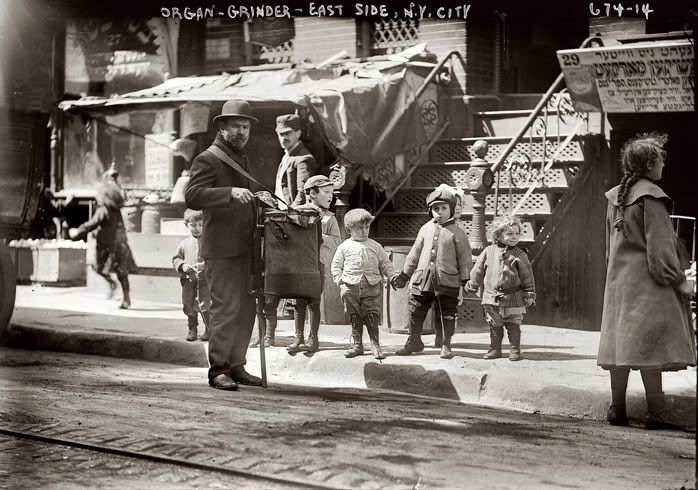
In his autobiography, Samuel Chotzinoff mentions the presence of the neighborhood organ grinders.
An organ grinder on the streets of New York's Lower East Side circa 1910. 5x7 glass negative, George Grantham Bain Collection, from the great shorpy site
The comments from the posting at shorpy
My Yiddish is not great, but what I can understand of the sign on the right is: "Don't go any further Market." Following is an account of the different plates they sell, one of which is chicken. The right side of the sign is cut off, so I can't see the beginning of the phrases. Great image. This appears to be a 'pipe' organ type. A web search of 'Busker organ' will lead you to further information if you have an interest. "Busker" is a term for a street performer working for tips. They were much more prevalent in Europe than the U.S. (this is also true today). Like bagpipes, you either like the sound, or you don't. It is a virtual certainty that there was a monkey nearby.
The children appear to be watching something off to the right, possibly the monkey asking for money. The monkey could also be behind the grinder, the boy to his rear appears to be holding a tether. Angelo Rulli is an organ grinder historian. He says that while the music was supposed to be the real draw, the organ grinder's monkey was a necessary tool of the trade "The monkey was a matter of economics. Because the monkey has an opposable thumb the monkey could hold a cup and by holding a cup, the monkey could go out into the crowd and bang people on the knees and collect money while the grinder was plying his trade." The monkey may have collected the cash, but it wasn't necessarily for the reason you'd think. It was more often to get rid of them rather than for musical appreciation. "The irony of the grinder and the music that was played is that as often as not, they were paid to get out of the neighborhood...because it was for the most part terrible music.Ultimately, over the years, all of the major cities in America imposed laws, very, very strictly enforced laws as to the hours that a grinder could be on streets." In the end though, it wasn't laws or bad music that finished off organ grinders. "The transistor changed everything, music was now affordable for every American family it wasn't necessary to go to the streets for music. And at about the same time there became a greater awareness of the way that animals were being used for profit. So the organ grinder and the monkey sort of faded away more or less about the same time, after WWII."


























No comments:
Post a Comment